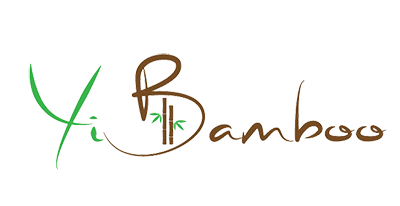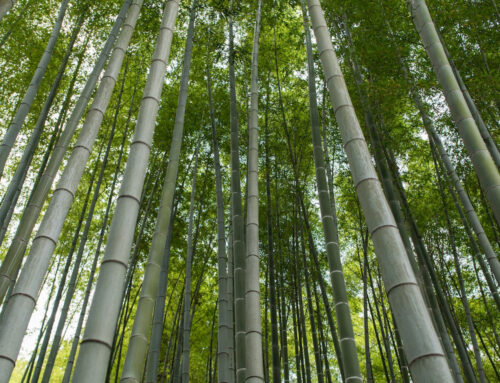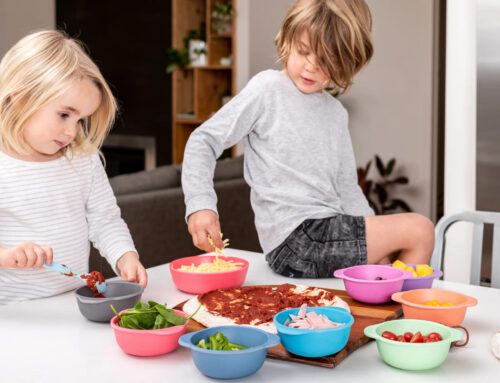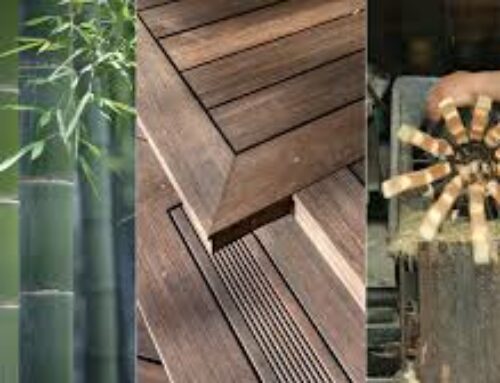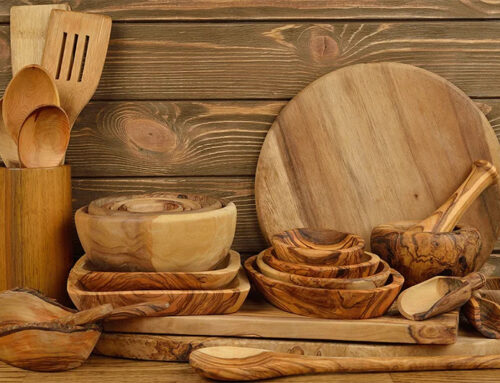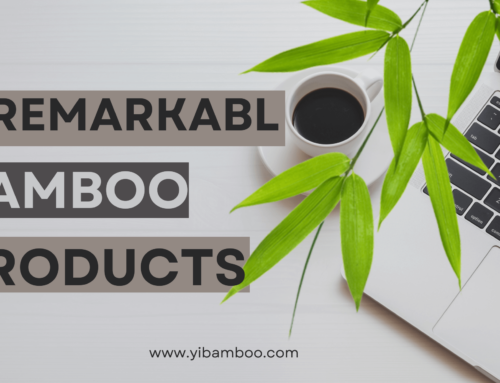Bamboo products offer several advantages, some of which include:
- Eco-Friendly: Bamboo is a highly renewable resource that grows incredibly fast and requires no pesticides or fertilizers. It is also biodegradable, making it a sustainable and eco-friendly alternative to traditional materials.
- Renewable Resource: Bamboo is a fast-growing grass that can grow up to 91 cm (36 inches) in just one day. It can be harvested every 3 to 5 years, making it a highly renewable resource. In comparison, most trees take decades or even centuries to reach maturity and can only be harvested once.
- Minimal Environmental Impact: Bamboo requires very little water and no fertilizers or pesticides to grow, which reduces its environmental impact. In contrast, other crops such as cotton require large amounts of water and are often grown with the use of harmful chemicals.
- Biodegradable: Bamboo products are biodegradable, which means they can be broken down naturally by microorganisms without releasing harmful chemicals into the environment. This makes them a sustainable alternative to plastic and other synthetic materials that can take hundreds of years to decompose.
- Carbon Sequestration: Bamboo is a natural carbon sink, which means it absorbs more carbon dioxide from the atmosphere than it releases. This helps to reduce greenhouse gas emissions and mitigate the effects of climate change.
- Durable: Bamboo is incredibly strong and durable, making it ideal for use in a variety of products such as furniture, flooring, and kitchenware. It is also resistant to water and stains, making it easy to clean and maintain.
- Strength: Bamboo is a naturally strong and durable material. It has a tensile strength that is stronger than many alloys of steel, which means it can withstand pressure and tension without breaking.
- Resilience: Bamboo has natural resilience, which means it can bend without breaking. This makes it an ideal material for products that need to withstand high impact or pressure, such as flooring, furniture, and construction materials.
- Moisture Resistance: Bamboo is naturally moisture-resistant, which means it is less likely to warp or crack when exposed to moisture. This makes it ideal for use in products such as cutting boards and kitchenware that are exposed to water.
- Pest Resistance: Bamboo has natural pest-resistant properties, which means it is less likely to be damaged by pests such as termites or ants. This makes it an ideal material for use in construction and furniture.
- Longevity: Bamboo products are designed to last for a long time with minimal maintenance. With proper care, bamboo products can last for years, making them a cost-effective and durable alternative to other materials.
- Lightweight: Despite its strength and durability, bamboo is lightweight and easy to transport. This makes it an ideal material for products that need to be carried or transported, such as camping gear or picnic baskets.
- Hollow Structure: Bamboo has a hollow structure with thin walls, which makes it lighter than many other materials. This structure also makes it strong and durable, while still being lightweight.
- Low Density: Bamboo has a low density, which means it has less mass per unit volume compared to other materials such as wood or metal. This low density makes it a lightweight material that is easy to transport and handle.
- High Strength-to-Weight Ratio: Despite its lightweight nature, bamboo has a high strength-to-weight ratio, which means it can support a lot of weight without adding extra mass. This makes it an ideal material for products that need to be strong and durable but still lightweight, such as furniture, bicycles, and sporting equipment.
- Easy to Work With: Bamboo is easy to work with, which makes it easy to shape and mold into different products. This also makes it easier to create lightweight products that are designed for specific purposes.
- Versatile: Bamboo can be used to make a wide range of products, from furniture and flooring to clothing and kitchenware. It can be woven, molded, and shaped to suit a variety of applications and designs.
- Easy to Work With: Bamboo is easy to work with and can be shaped, molded, and cut into a variety of shapes and sizes. This makes it a versatile material that can be used to create a wide range of products, from furniture and flooring to clothing and kitchenware.
- Available in Different Forms: Bamboo is available in different forms, such as solid bamboo, bamboo laminates, and bamboo composites. This versatility allows for a wide range of applications and designs.
- Aesthetic Appeal: Bamboo has a unique and appealing aesthetic, with its natural grain and color variations. It can be used to create products that are modern or traditional in design, making it a versatile material for a wide range of applications.
- Sustainable Material: Bamboo is a sustainable material that is renewable, biodegradable, and has a low environmental impact. This makes it an ideal material for eco-friendly products that are versatile and sustainable.
- Durable and Strong: Bamboo is a strong and durable material that can be used to create products that are long-lasting and reliable. This versatility makes it an ideal material for products that need to be sturdy and dependable, such as furniture and construction materials.
- Health Benefits: Bamboo is naturally antimicrobial and hypoallergenic, making it ideal for use in products such as bedding and clothing. It also contains a natural antibacterial agent called “bamboo kun” that helps to repel insects and pests.
- Hypoallergenic: Bamboo is a hypoallergenic material, which means it is less likely to cause allergic reactions. This makes it an ideal material for products such as clothing and bedding, especially for people with sensitive skin or allergies.
- Antibacterial and Antifungal Properties: Bamboo has natural antibacterial and antifungal properties, which means it can help prevent the growth of bacteria and fungi that can cause infections or odors. This makes it an ideal material for products such as cutting boards and kitchenware.
- Moisture-Wicking: Bamboo is naturally moisture-wicking, which means it can absorb moisture and sweat from the skin, keeping it dry and comfortable. This makes it an ideal material for products such as athletic wear and socks.
- UV Protection: Bamboo has natural UV protection, which means it can help protect the skin from harmful UV rays. This makes it an ideal material for products such as hats and clothing that are worn in the sun.
- Eco-Friendly: Bamboo is a sustainable and eco-friendly material, which means it is better for the environment and can contribute to a healthier planet. This makes it an ideal choice for people who are environmentally conscious and want to make more sustainable choices.
- Cost-effective: Bamboo products are often less expensive than their counterparts made from traditional materials such as wood or plastic. This makes them a cost-effective alternative that is also eco-friendly and durable.
- Renewable and Sustainable Material: Bamboo is a renewable and sustainable material, which means it can be grown and harvested relatively quickly compared to other materials. This means that bamboo products can be produced at a lower cost than products made from non-renewable or less sustainable materials.
- Easy to Grow: Bamboo is a fast-growing plant that can grow up to 91 cm (36 inches) in just one day. This means that bamboo can be harvested more frequently than other plants or trees, which can reduce the cost of production.
- Low Maintenance: Bamboo is a low-maintenance crop that requires little water, fertilizer, or pesticides. This means that the cost of growing and maintaining bamboo is lower than other crops that require more inputs.
- Durable and Long-Lasting: Bamboo products are often durable and long-lasting, which means they may not need to be replaced as frequently as other products. This can save money in the long run, as you won’t need to spend as much on replacements.
- Versatile and Adaptable: Bamboo is a versatile material that can be used to make a wide range of products, from furniture and flooring to clothing and kitchenware. This versatility means that bamboo products can be adapted to different markets and consumer needs, which can increase their cost-effectiveness.
Bamboo products offer a sustainable and environmentally friendly alternative to traditional materials, along with durability, versatility, and other benefits.
At Yi Bamboo Limited, we strive to provide excellent customer service and ensure that our products meet the highest standards of quality. Our team of experts is available to assist you with any questions you may have, and we are committed to providing timely and efficient service to all of our customers.
